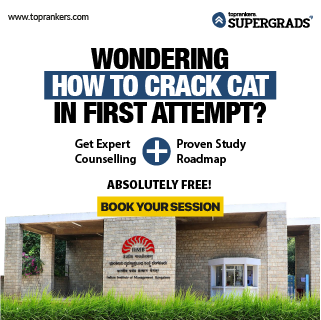Is Cracking CAT as a Non-Engineer Possible? Myths, Strategies, and Insider Tips
November 26, 2025
Overview: Is it possible to crack CAT as a Non-Engineer? Well, yes, it is. Read on to know the key strategies and Insider tips with us!
Are you a non-engineer wondering if you can successfully crack the CAT exam? The good news is, you absolutely can!
Many non-engineering graduates have navigated this challenging test and achieved excellent results.
Cracking CAT as a Non-Engineer may seem challenging at first, but with the right strategies and mindset, it is absolutely achievable.
Here we will cover the common myths and fears that often hold non-engineers back. By understanding the true nature of the exam and applying effective strategies, you can build your confidence and skill set.
Let’s dive into the key to Cracking CAT as a Non-Engineer insider tips, smart preparation, and a belief in your potential.
Also Read | Best MBA Colleges in India
Table of Contents
- Overcoming the Stigma: Common Fears and Misconceptions
- Debunking the Myths: CAT's Quant and DILR Sections
- CAT for Non-Engineers: Key Strategies
- Leveraging Your Non-Engineering Background
- The Role of Internships and Placements
- Timing Your Preparation: When to Start and How to Maximize Your Time
- Is It Possible for Non-Engineers to Crack CAT with Limited Time?
- Joining the CAT Set Go Community
- Key Takeaways
- Conclusion
Overcoming the Stigma: Common Fears and Misconceptions
As non-engineers, we often face a mental stigma when it comes to the CAT exam. Even before the game starts, many of us are plagued by self-doubt, wondering whether we'll perform well. This stems from a few common fears and misconceptions:
1. The Quant Conundrum
The first major stigma concerns the Quantitative Aptitude section. Many non-engineers feel that this section is heavily skewed towards engineering-level mathematics, which they may not have studied since 10th grade.
2. The DILR Dilemma
The second concern is the Data Interpretation and Logical Reasoning (DILR) section. Non-engineers often worry that they may not be able to excel in this area as well as their engineering counterparts.
3. The Engineering Bias
Another common thought is that CAT is primarily an "engineer's game." This misconception leads many non-engineers to believe they may not be able to pass the exam.
However, the landscape has undergone significant changes in recent years. Top B-schools now actively seek a diverse student body, including both engineers and non-engineers.
As a result, Cracking CAT as a Non-Engineer has become a more attainable goal than ever before.
The evolution of the exam itself has also made it more inclusive, with a greater emphasis on logical reasoning and problem-solving skills rather than pure engineering-focused mathematics.Also Read: Best MBA Colleges for Consulting in India
Debunking the Myths: CAT's Quant and DILR Sections
One of the key myths we need to address is the perception that CAT's Quantitative Aptitude section is heavily skewed towards engineering-level mathematics.
The truth is, the majority of the topics covered in the Quant section are not directly related to the engineering mathematics studied in the 11th and 12th grades.
In engineering, the mathematics we study typically includes conic sections, calculus, vectors, and 3D geometry.
However, these topics rarely appear in the CAT exam. Instead, the Quant section focuses more on logical reasoning, data interpretation, and basic arithmetic concepts covered through 10th grade.
Similarly, the DILR section is not about engineering-specific skills. It's more about logical reasoning, data analysis, and problem-solving abilities - skills that are not necessarily tied to an engineering background.
In fact, many non-engineers who have strong analytical and critical thinking abilities have performed exceptionally well in the DILR section.
CAT 2026 Demo Classes
| Take DILR Demo Classes by Supergrads | |
| Take VARC Demo Classes by Supergrads | |
| Take QA Demo Classes by Supergrads |
CAT for Non-Engineers: Key Strategies
If you're a non-engineer who hasn't studied mathematics beyond 10th grade, the most important thing is to go back to the basics and ensure that you have a strong conceptual understanding. This means revisiting topics like arithmetic, algebra, and geometry that you covered in your earlier schooling.
- The key is to build a solid foundation and then gradually progress to solving more complex problems.
- Engage in layered learning, where you start with understanding the concepts, then move on to solving examples, and finally practice a large number of questions.
- This approach will help you develop the logical reasoning and problem-solving skills required for the CAT exam.
- Another important strategy is to maintain a consistent and committed approach to your preparation.
- Many non-engineers make the mistake of thinking that they can cram everything in the last few months before the exam. However, this is not a practical approach.
- Instead, start your preparation early and dedicate a consistent amount of time to it over several months.
- Alongside your preparation, it's crucial to analyze your performance through mock tests regularly. This will help you identify your strengths and weaknesses, allowing you to focus your efforts on the areas that need the most attention.
- For those focused on cracking CAT as a Non-Engineer, this step becomes even more vital to track conceptual understanding and progress.
The OMET & CAT Test Series can be a valuable resource for this purpose, providing you with a comprehensive set of mock tests to assess your performance effectively.
Also Read | How to Start MBA Preparation For CAT 2026 [Study Plan]
Leveraging Your Non-Engineering Background
While it's true that your academic background may not directly align with the engineering-focused topics in the CAT syllabus, this doesn't have to be a disadvantage. Your non-engineering background can be a strength in certain areas of the exam.
For instance, in the DILR section, the ability to think critically and analyze data from a non-technical perspective can be a valuable asset. Similarly, in the Verbal Ability and Reading Comprehension sections, your familiarity with language and communication skills can give you an edge.
Additionally, the evolution of the CAT exam has made it more inclusive, with a greater emphasis on logical reasoning and problem-solving skills rather than pure engineering-focused mathematics. This means that your ability to think critically and practically apply concepts can be just as valuable as technical expertise.
To leverage your non-engineering background, it's important to focus on developing your analytical and problem-solving skills. Engage in activities that challenge your critical thinking, such as case studies, business simulations, and real-world problem-solving exercises. This will not only help you excel in the CAT exam but also prepare you for the demands of a management program and the corporate world.
The Role of Internships and Placements
When it comes to the MBA journey, your academic background plays a less significant role than you might think. Academically, the key factors are your grades and overall performance in the program.
During the summer internship and final placement process, companies are more interested in your problem-solving skills, strategic thinking, and hands-on experience than your specific academic background.
For instance, if you're aiming for a product management role, having experience with tools like Jira, Figma, or Slack can be more valuable than your engineering or non-engineering background.
The same principle applies to consulting and other roles. What matters most is your ability to think critically, solve problems, and demonstrate your potential to make meaningful contributions to the organisation.
Your non-engineering background can even be an advantage in certain cases, as it can bring a fresh perspective and a diverse set of skills to the table.
So, don't let your academic background hold you back. Focus on developing the skills and experiences that are relevant to the roles you're interested in, and showcase your unique strengths during the interview process.
The CAT Online Course and Free Demo Class can be great resources to help you prepare for the exam and the MBA journey ahead.
Check: FMS Delhi MBA Admission Criteria
Timing Your Preparation: When to Start and How to Maximize Your Time
Given the common fears and misconceptions that non-engineers face, the question arises: Is it possible for a non-engineer to start their CAT preparation in time and succeed?
The answer is a resounding yes, but with a caveat. The next five months leading up to the CAT exam need to be utilized in a very judicious manner. As a non-engineer, you need to understand your strengths, weaknesses, and the specific areas where you need to focus your efforts.
If you feel that your basic mathematical concepts are shaky, it's crucial to revisit those topics thoroughly. Ensure that you have a strong grasp of the fundamental concepts covered up to 10th grade, such as arithmetic, algebra, and geometry.
This layered learning approach will be crucial in developing the logical reasoning and problem-solving skills necessary for the CAT exam.
Additionally, it's important to start writing mock tests early on. This will not only help you identify your problem areas but also allow you to develop the necessary exam-taking strategies and time management skills.
The OMET & CAT Test Series can be a valuable resource for this purpose, providing you with a comprehensive set of mock tests to assess your progress.
Remember, the key is to avoid waiting until the last minute. Cramming everything in the final few months is not an effective strategy. Instead, start your preparation early, identify your strengths and weaknesses, and focus your efforts on the areas that need the most attention.
This will ensure that you make the most of the time you have and increase your chances of success in the CAT exam.
CAT 2026 Mock Test to Boost Your Prep
| Free CAT Mock Test -01 | |
| Free CAT Mock Test- 02 | |
| Free CAT Mock Test- 03 |
Is It Possible for Non-Engineers to Crack CAT with Limited Time?
Even if you haven’t started preparation yet and have only a few months left, Cracking CAT as a Non-Engineer is still possible with the right approach. The key is smart preparation:
-
Identify your strengths and weaknesses early.
-
Focus your efforts on high-impact topics that can help you clear the cutoff and aim for a strong percentile.
-
Use the available time judiciously, balancing concept revision, practice, and mock tests.
Remember, CAT preparation is a journey of continuous learning and improvement. It’s not about how much time you have but how effectively you use it.
Read More| Detailed strategy of CAT Exam Preparation
Joining the CAT Set Go Community
As you embark on your CAT preparation journey, it's important to surround yourself with a supportive community of like-minded individuals. The CAT Set Go community is a great platform for MBA aspirants, mentors, B-school alumni, and other specialists to connect, share insights, and collaborate.
By joining this community, you'll have access to a wealth of resources, including expert guidance, study materials, and networking opportunities. You'll also be able to connect with other non-engineers who are facing similar challenges and can share their experiences and strategies for success.
Remember, you don't need to be an engineer to crack the CAT exam. With the right mindset, strategies, and support, non-engineers can thrive in this competitive landscape. So, take the first step and join the CAT Set Go community today to kickstart your journey towards a successful MBA career.
Key Takeaways
- Non-engineers often face common fears and misconceptions about the CAT exam, such as the perceived difficulty of the Quantitative Aptitude and Data Interpretation and Logical Reasoning (DILR) sections.
- The CAT exam has evolved to be more inclusive, with a greater emphasis on logical reasoning and problem-solving skills rather than pure engineering-focused mathematics.
- Strategies for non-engineers include revisiting the basics, establishing a solid conceptual foundation, and engaging in a layered learning approach and consistent preparation.
- Non-engineering backgrounds can be leveraged as a strength, particularly in areas like DILR, Verbal Ability, and problem-solving.
- Academic background plays a less significant role in the MBA journey, with companies focusing more on problem-solving skills, strategic thinking, and relevant experience.
- Timing your preparation is crucial, as it requires starting early, identifying strengths and weaknesses, and utilizing resources like the OMET & CAT Test Series.
- Joining the CAT Set Go community can provide valuable support, resources, and networking opportunities for non-engineer CAT aspirants.
Remember, with the right mindset, strategies, and support, non-engineers can thrive in the CAT exam and beyond. Embrace your unique background, focus on developing the necessary skills, and utilize the resources available to you. The path to a successful MBA journey is open to all, regardless of your academic discipline.
Conclusion
The idea that CAT is an "engineers’ game" is a myth. Whether you come from commerce, the arts, or any non-technical background, CAT is about being a logical thinker and a committed learner.
By revisiting basics, building concept clarity, practicing regularly, and strategically using mock tests, Cracking CAT as a Non-Engineer becomes a confident and achievable goal, enabling aspirants to excel in their MBA journey.
“You do not need to be an engineer or a non-engineer to crack CAT you just need to be a learner.”
So, start your preparation with confidence, break the mental stigma, and focus on smart, consistent efforts. Your background is just one part of the equation—your mindset and strategy will determine your success.
Frequently Asked Questions
Can non-engineers succeed in the CAT exam?

Is the Quantitative Aptitude section difficult for non-engineers?

What should I focus on if I haven't studied math beyond 10th grade?

How important are mock tests in CAT preparation?

Can my non-engineering background be an advantage in the exam?













SHARE